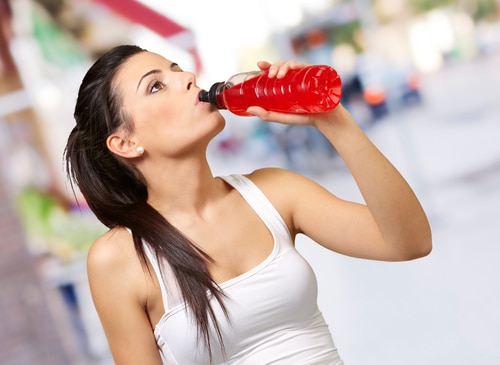
Sports Drinks
Sports drinks not only help you stay hydrated – they help to replenish electrolytes such as sodium, potassium, and chloride you lose during a serious sweat session. They also contain sugar to help maintain your glycogen stores during exercise. The problem is some sports drinks contain TOO much sugar and are relatively high in calories. Unless you’re doing a long or intense workout, the sugar and calories in sports drinks could make it harder to lose weight, especially if you’re drinking them frequently. Plus, some sports drinks have artificial flavorings and colorings you don’t need.
Should you sip them? If you’re exercising for less than an hour, probably not. If you’re doing a 40-minute cardio interval workout, you probably won’t lose enough electrolytes or need the carbohydrate support sports drinks offer. If you’re running a marathon or working out for more than an hour at a stretch, a sports drink can help you keep your electrolytes optimized, especially if you’re working out in a hot environment and sweating a lot. Even then, a more natural alternative like coconut water will work as well. Coconut water contains significant amounts of potassium and moderate amounts of sodium, calcium, and magnesium, electrolytes you lose when you sweat. Plus, it has only 40 to 50 calories per serving.
Fitness Waters
Fitness waters are similar to sports drinks but they’re usually lower in carbs – and some have no carbs. On the plus side, they contain electrolytes like sodium and potassium that you lose when you sweat. They’re mainly for people who want a hydration beverage that tastes good but don’t want the added calories. Some fitness waters also contain synthetic vitamins in addition to electrolytes.
Do you need them? Again, plain water will be sufficient for hydration if you’re exercising for less than an hour. For longer workouts, coconut water is an electrolyte-rich option that’s free of artificial additives you don’t want in your diet. You can also find a number of recipes for making your own sports drinks and fitness waters at home using natural ingredients like fresh-squeezed lemon, lime and orange and the sweetener of your choice. The benefits? They’re free of artificial flavorings and you control what goes in them.
Flavored Water
Flavored water is water with added flavor to give it more sip appeal. Nothing magical about it. Flavored waters are usually sweetened with sugar or artificial sweeteners. Although some claim to use natural flavorings, even the “natural” ones typically contain preservatives like sodium benzoate. On the plus side, there are some flavored waters out there that have no preservatives or artificial sweeteners. Problem is, like most hydration beverages, they come in a plastic bottle lined with BPA. (bisphenol-A) Keep them in a warm environment too long and some of that BPA can leach into your beverage.
Do you need them? Flavored water is made for people who have a hard time drinking unflavored water. You can avoid the downsides such as the plastic bottle by buying a stainless steel bottle and filling it yourself with water you’ve flavored with fresh lemon, lime, mint or herbs. Why pay someone to flavor your water for you and serve it to you in a plastic bottle?
Vitamin Water
Some manufacturers have taken hydration a step further by adding vitamins to flavored water. It certainly sounds healthy to sip water with vitamins, but you absorb vitamins best from food sources, especially fat-soluble vitamins like vitamins A, D, E and K. It’s unlikely the vitamins in these drinks are going to improve your health or “give you energy” as the manufacturers would have you think. Plus, many of these drinks are loaded with sugar, so much so that a Federal judge called them a “non-carbonated fruit coke disguised as a sports drink.” Some contain caramel coloring, a controversial coloring agent linked with cancer in rodents.
Do you need them? Definitely not. This is a “feel good” ploy by vitamin water makers to make you think you’re improving your health when you sip their beverages. Get your vitamins from whole foods instead.
The Bottom Line?
Unless you’re planning a long workout, water is an acceptable hydration beverage. If you want more flavor – add a little unsweetened, fresh fruit juice. For longer workouts where electrolyte loss and glycogen depletion, sip unsweetened coconut water or add honey to coconut water for more carbohydrates. Who needs the plastic bottles, preservatives, and artificial coloring? You’ll save money too.
Here’s another tip – after resistance training, drinking milk. A study published in Medicine and Science in Sports and Exercise showed milk not only hydrates – it speeds up muscle recovery. Add a scoop of raw cocoa powder to make your recovery drink even more heart healthy. Drink up, stay hydrated – but keep it natural.
References:
Consumerist. “Vitamin Water Isn’t Healthy Says Federal Judge”
Medicine and Science in Sports and Exercise. “Milk Consumption After Training Limits Muscle Damage” Fitness Rx. July 2013, page 30.
Related Articles By Cathe:
4 Natural Sports Drink Alternatives
Sugar Shock: Do You Know How Much Sugar You’re Really Getting in Your Diet?

